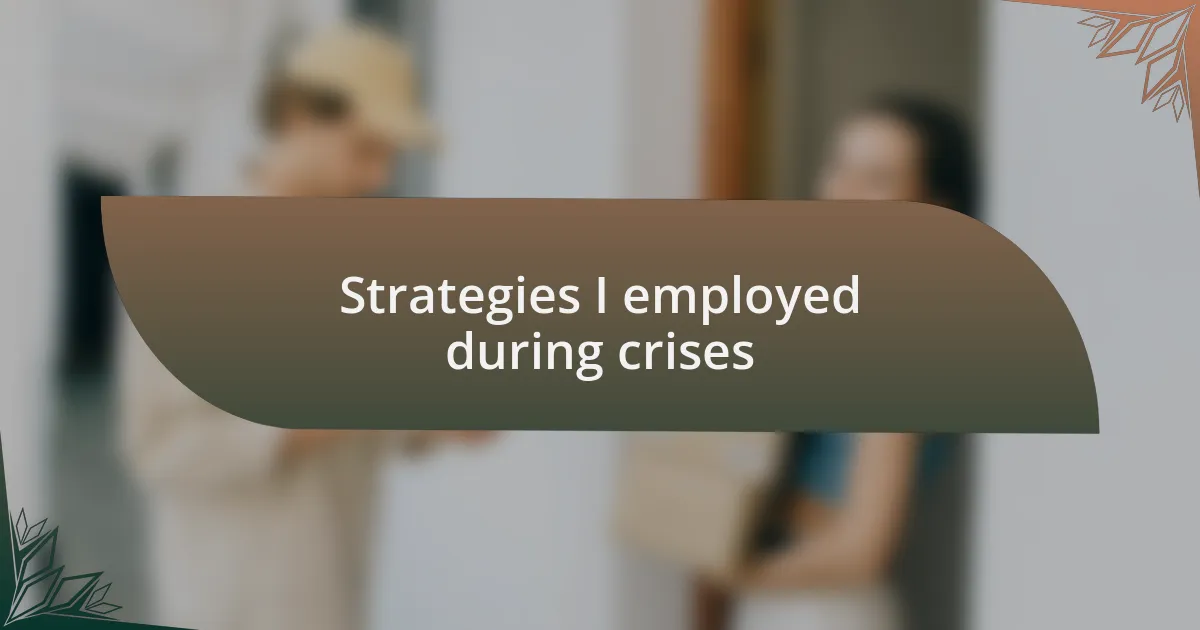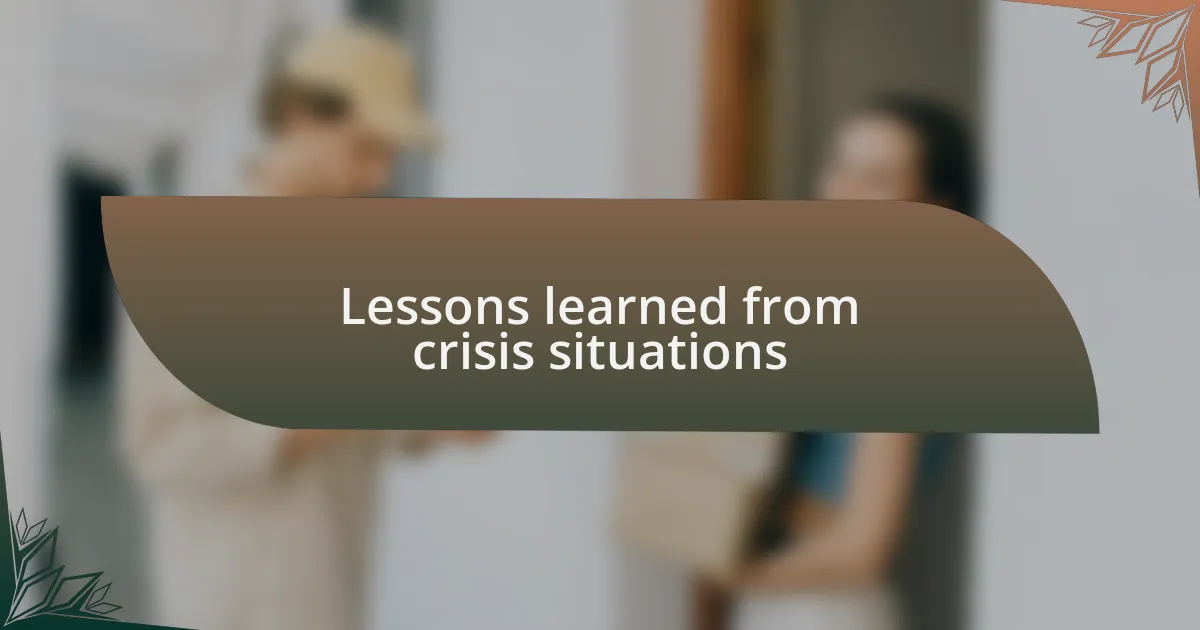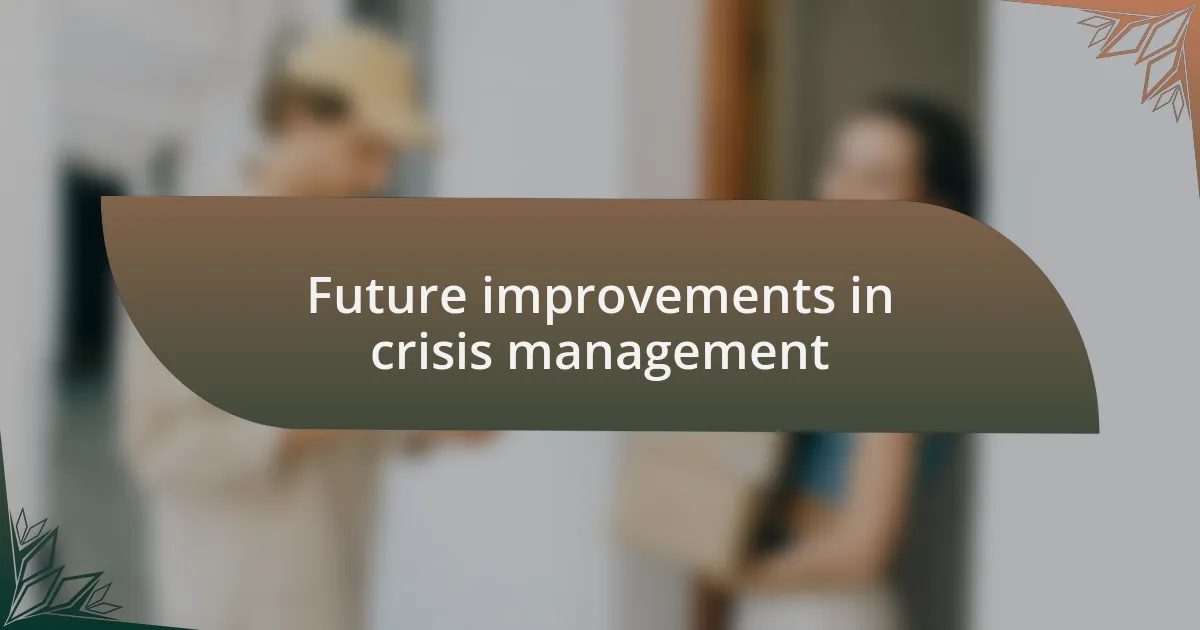Key takeaways:
- Establishing clear communication channels during crises fosters a supportive team environment and allows for quick strategy pivots.
- Prioritizing tasks based on impact, such as focusing on user experience during a site outage, can reinforce client trust and reputation.
- Emphasizing adaptability and empathy helps teams navigate unexpected challenges and strengthens client relationships.
- Documenting crisis responses creates valuable references for improving future crisis management and preparedness.

Strategies I employed during crises
One of the first strategies I employed during crises was to establish clear communication channels within my team. I remember a particularly stressful project where tight deadlines and unforeseen technical issues loomed over us. By scheduling daily check-ins, I fostered an environment where everyone felt comfortable sharing their concerns, which not only eased the tension but allowed us to pivot our strategy quickly.
In another instance, I found that prioritizing tasks based on impact was crucial. During a major site outage, I had to choose between fixing the user experience or addressing backend errors first. I chose to tackle user experience issues, understanding that our clients’ immediate perceptions greatly influenced their trust in us. This decision, though nerve-wracking, ultimately reinforced our reputation for reliability.
Finally, I leaned heavily on post-crisis reflection to learn from each situation. After navigating a particularly chaotic redesign, I initiated a “lessons learned” session with my team. This was not just about what went wrong, but also about celebrating the small victories. How could we not grow from this? I found that embracing both our successes and failures created a culture of resilience, transforming future crises into opportunities for growth.

Lessons learned from crisis situations
When reflecting on my experiences, one of the key lessons I learned is the importance of adaptability. There was a time when an unexpected update disrupted our design workflow, throwing us into a tailspin. I had to remind myself and my team that flexibility isn’t just an asset, it’s a necessity. I encouraged everyone to experiment with alternative solutions, and in doing so, we often discovered innovative ways to enhance our design process. Have you ever found that a change you initially resisted led to something unexpectedly beneficial?
Another significant takeaway from crisis situations is the value of empathy. During a particularly challenging client interaction, I realized that my focus needed to be less on the problem at hand and more on how the client felt. Taking a moment to acknowledge their concerns not only diffused the tension but also established a stronger bond of trust. How often do we forget that behind every project, there are real people with real emotions? This approach not only solidified our relationship with that client but also reminded me of the power of human connection in our industry.
Finally, I learned that documenting the crisis and our response is invaluable for future reference. There was a project where everything seemed to go wrong, but instead of just moving on, I created a detailed account of what happened and how we resolved it. This blueprint became a guide for us, helping to navigate similar situations in the future with confidence. Isn’t it fascinating how even the toughest challenges can serve as important lessons if we take the time to reflect on them?

Future improvements in crisis management
Future improvements in crisis management can greatly benefit from enhanced communication strategies. In my experience, misinformation can exacerbate any situation, leaving teams feeling anxious and unprepared. I remember a time when quick updates led to confusion among my team. Imagine if we had developed a centralized platform for sharing real-time information; it could have streamlined our responses and bolstered the team’s confidence. How often do we underestimate the power of clear communication in a crisis?
Investing in training programs for crisis preparedness is another area ripe for improvement. After facing a major setback where our website went down unexpectedly, I wished we had practiced our response plan more rigorously. Reflecting on that moment, I realized that simulated crisis scenarios could foster not only readiness but also teamwork under pressure. Have you ever thought about how rehearsing potential challenges could transform your response time during a real crisis?
Moreover, leveraging technology can be a game changer. For instance, using automated alerts to inform both the team and clients about an issue can maintain transparency and assurance. I believe that integrating AI tools could give us real-time insights into potential crises before they escalate, ultimately allowing for proactive measures. Wouldn’t it be incredible if we could anticipate challenges instead of merely reacting to them?